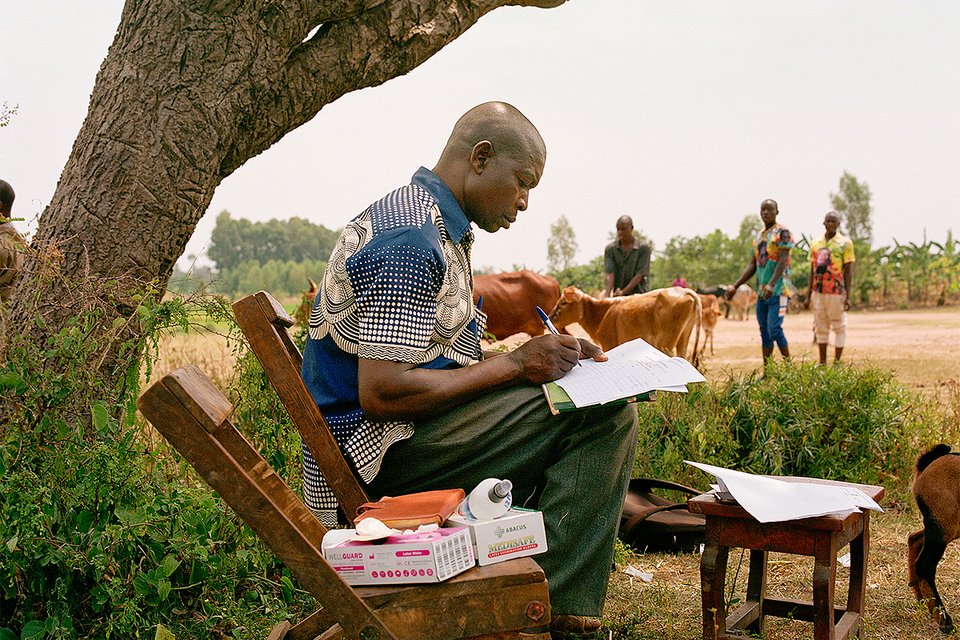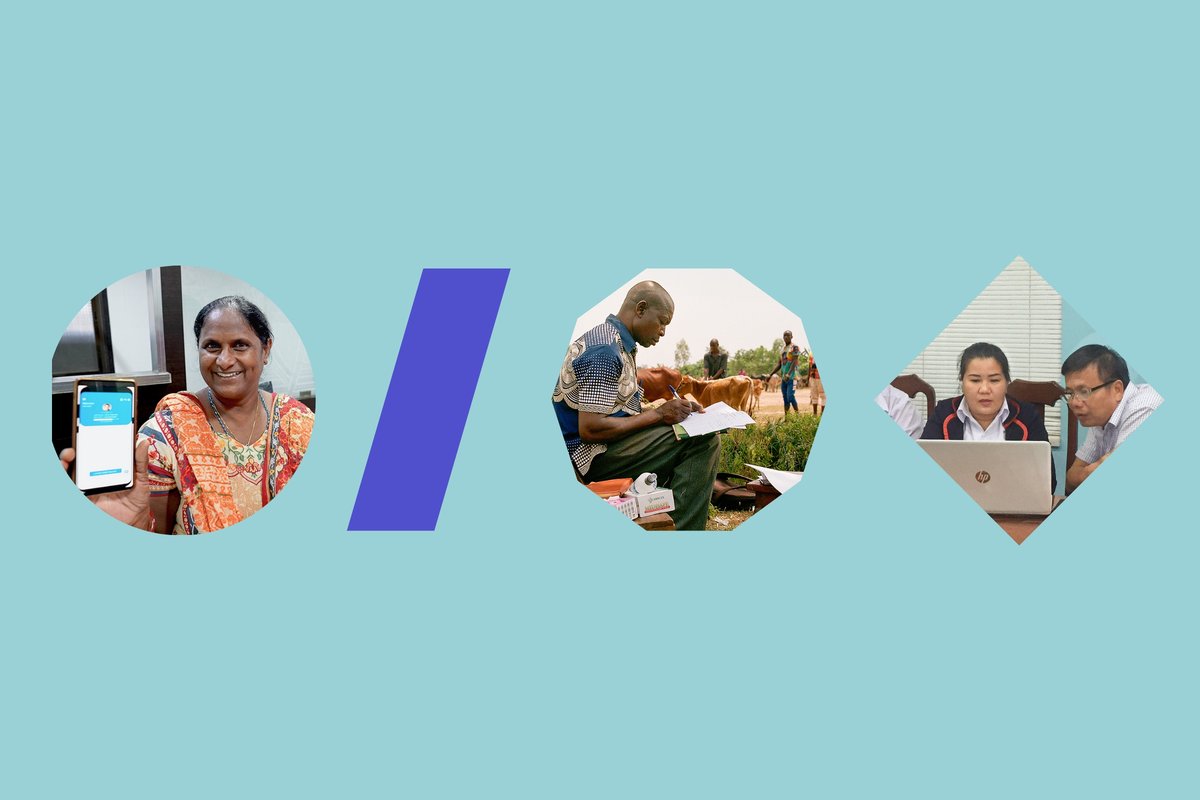PATH supports India’s National Digital Health Mission
In 2021, India’s National Health Authority launched the Ayushman Bharat Digital Mission (ABDM). The aim of ABDM is to create a comprehensive national digital health ecosystem for India’s 1.3 billion citizens that bolsters the push for universal health coverage and revolutionizes health care delivery. Given India’s substantial reliance on private-sector health care services, it is imperative to involve the private sector in this nationwide push for digitalization. To address the challenge of bridging public and private, in October 2022, PATH supported the National Health Authority and state and city governments to pilot a scalable model for private-sector engagement and digitalization in Mumbai.

Staff nurse Sunita Sharma (right) shows patient Jyoti Mohite (left) how to access her digital medical records on her mobile phone by installing and using one of the government’s approved digital applications. Photo: PATH
1 of 2 2 of 2
2 of 2
Preparation for the pilot involved intensive training of on-site managers, awareness about the benefits of ABDM, review of health management information system options, and effective communication with health care providers. To enhance awareness and encourage adoption, PATH developed outreach materials including video messages from influential figures and held mass outreach sessions in partnership with local authorities and doctors networks. PATH, through an interface agency, provided individualized support for installing and utilizing ABDM’s approved digital applications for appointment booking, digital record keeping, and seamless data exchange with patient consent.
“The Mumbai microsite prototype has now been transitioned to the state government for continued operations,” said Sameer Kanwar, Director of Digital Health for PATH South Asia. “This project introduced a sustainable, adaptable, and scalable private-sector engagement model, swiftly propelling the nationwide uptake of digital health practices and reshaping the National Digital Health Incentive Scheme, rendering clinics eligible for financial incentives.”
This work advanced the Improving lives with science and technology (P2) and Increasing health system capacity and resilience (P3) strategic priorities.
PATH featured by BBC StoryWorks on pandemic preparedness and climate change
In 2023, PATH participated in “The Climate and Us,” a new series presented by the Global Climate and Health Alliance and produced by BBC StoryWorks. This groundbreaking series explores how climate change is impacting human health and highlights emerging solutions.
Spanning six continents and comprising 31 compelling stories, “The Climate and Us” highlighted PATH’s work in Uganda to address the delayed dangers that often follow devastating floods—including the threat of disease outbreaks, such as the deadly bacterial infection anthrax, which affects both humans and animals. By implementing innovative approaches, including the vaccination of cows and educational efforts, PATH has been supporting veterinarians and medical professionals in Uganda to protect lives and livelihoods while preventing the spread of zoonotic diseases.

As part of the USAID-funded Infectious Disease Detection and Surveillance project, PATH supports Uganda in linking its animal and human health systems—and conducting routine vaccination drives to immunize farm animals (pictured). Photo: PATH/Derrick Mimbe
1 of 2 2 of 2
2 of 2
“Preventing zoonotic diseases like anthrax is critical, as many families depend on their animals for their livelihoods,” said Dr. Laura Lydia Adong, Laboratory Manager and Veterinary Officer at Mbale Veterinary and Diagnostic Laboratory. “When families lose their animals, they may lose a source of income required to pay for school fees or tuition for their children.”
Dr. Jeni Miller, Executive Director of the Global Climate and Health Alliance, emphasized the importance of addressing climate change’s impact on health, stating, “Every day, those of us in the health community witness the toll that climate change and its impacts—extreme storms, heat waves, droughts, sea level rise, and flooding—take on people’s lives, their health, and wellbeing. While the threats and challenges are significant, hope lies in the many efforts people all around the world are making to respond to every aspect of climate change.”
This work advanced the Preparing for and responding to emerging health threats (P1) and Improving lives with science and technology (P2) strategic priorities.
Strengthening animal health surveillance to improve pandemic preparedness
In 2018, the Vietnamese government launched the Vietnam Animal Health Information System (VAHIS) to facilitate the reporting and management of animal disease data. Present in each of Vietnam’s 63 provinces, VAHIS was designed for government animal health personnel at national, regional, and provincial levels. Though the system was far-reaching, it faced challenges in timeliness and completeness in reporting animal disease outbreaks.
In response to a support request from the Vietnam Department of Animal Health, from September 2022 to October 2023, the USAID-funded Infectious Disease Detection and Surveillance (IDDS) project collaborated with relevant authorities to assess needs and organize training courses for district staff in Binh Dinh, Can Tho, Dong Thap, Khanh Hoa, and Thai Nguyen Provinces. PATH’s IDDS staff also worked with the software developers who originally created VAHIS to craft new demo software and a new reporting layer for district-level staff, and to provide technical support and coaching to ensure correct reporting of data into VAHIS.
The IDDS project is also supporting the development of a VAHIS mobile app to allow district staff to report data into VAHIS when they go to the field to conduct outbreak investigation. With direct access to VAHIS, district staff can report information accurately and in a timely manner, which aids in the prevention and control of animal disease outbreaks.

As part of the Infectious Disease Detection and Surveillance project, district staff receive training on the PATH-supported Vietnam Animal Health Information System, which makes it easier to report and manage animal disease data. Photo: PATH/Thuy Nguyen
1 of 2 2 of 2
2 of 2
District staff in IDDS-supported provinces can now practice entering data into the VAHIS demo software to master their reporting skills. “IDDS is a pioneer in extending VAHIS reporting to the district level,” said Dang Van Hung, the chief epidemiologist at Regional Animal Health Office No. 4. “By facilitating direct reporting of animal disease data into VAHIS from the district level, the quality of animal disease data will be improved significantly, and the animal health events will be reported sooner because district staff are often the first-line responders to animal outbreaks.”
This work advanced the Preparing for and responding to emerging health threats (P1) strategic priority.
Community health workers: the heroes in malaria data management
Community health workers (CHWs) are contributing immensely to the fight for a malaria-free Zambia through the data they collect. Accurate reporting of data helps policymakers and implementors make evidence-based decisions related to distribution of insecticide-treated bednets and strategies used to prevent stockouts of lifesaving drugs.
Grace Lungu is one of more than 4,000 health worker heroes who test, treat, and track malaria cases in Eastern Province, one of four provinces where PAMO Plus, a US President’s Malaria Initiative project, works. She is one of the CHWs responsible for data reporting, ensuring that malaria cases reported at the national level from the community are real, timely, and accurate. In Zambia, one in five patients with malaria is seen by a CHW, which explains the need for data accuracy in reporting of malaria cases.

Grace Lungu, a community health worker (left), and Mukomela Banda, PAMO Plus Surveillance Officer (right), show Dr. David Walton, US Global Malaria Coordinator (center), how health workers verify malaria data in their registers. Photo: PATH/Joy Talemwa
1 of 2 2 of 2
2 of 2
In her data register, Grace records whether a patient tested positive or negative. She also collects data from three other CHWs and feeds the information into a national malaria data management platform, District Health Information Software 2 (DHIS2), on a mobile phone.
“CHWs meet regularly at a central location to review data recorded in the national malaria database. This process, referred to as mentorship and technical support supervision, or simply MTSS, affirms CHWs because it shows that their work is noticed and appreciated,” explained Dr. Caroline Phiri-Chibawe, PAMO Plus Chief of Party.
Grace actively verifies figures in her register against data entered into the DHIS2 platform. For Grace, the most rewarding part of her work is seeing how every bit of information she records influences decision-making processes at the national level. High-quality data help streamline processes around lifesaving interventions like the distribution of insecticide-treated bednets, administration of indoor residual spraying, and procurement and stocking of malaria prevention medication for pregnant women in Zambia.
This work advanced the Increasing health system capacity and resilience (P3) strategic priority.
Strengthening Kenya’s primary health care system through policy
Kenya took significant strides advancing PHC in 2023, and PATH was a technical partner to the government every step of the way. One of the biggest milestones was passage of the Primary Health Care Act 2023, which aims to strengthen universal health coverage in Kenya and expand equitable access to PHC. PATH provided technical inputs into the legislation via technical working group meetings and working with a local partner, HENNET, to engage civil society partners in developing a memo for the national Senate Health Committee.
Another piece of legislation enacted at the national level, the Facility Improvement Financing Act 2023, was based on a model law PATH developed with the Council of Governors and partners. This law ensures revenue raised at the health facility level can be retained to improve service provision and ensure less disruption of services when there are funding gaps.
![Quote: “The PCN model is a sure pathway to advancing health equity by enhancing the delivery of [high-]quality, well-coordinated, and integrated PHC services for all people," by Rachel Ndirangu, Project Director for Advocacy and Public Policy](https://media.path.org/images/AR23-Kenya-PHC-quote.width-960.png) 1 of 2
1 of 2
 2 of 2
2 of 2
At the same time, PATH partnered closely with the Ministry of Health and county-level officials on the expansion of primary care networks (PCNs) and documentation of this process, a key step toward implementing Kenya’s “hub-and-spoke” model for PHC, in which multidisciplinary teams at hospitals serve as “hubs” and support several “spokes,” including pharmacies and community clinics. With PATH support, PCNs are now operational in Kitui, Machakos, and Makueni Counties, as part of a countrywide roll-out and scale-up plan.
PATH also joined WHO, UNICEF, and Lwala Community Alliance to train and deploy 248 master PCN trainers to strengthen PHC implementation across all 47 counties. Finally, PATH helped lay the groundwork for a large increase in PHC funding (up to 141.2 billion Kenyan shillings) made by the Ministry of Health late in 2023.
This work advanced the Increasing health system capacity and resilience (P3) strategic priority.
From vaccines and diagnostics to medical devices and digital tools, PATH develops and scales up health products that address local priorities and improve access.
PATH advances people-centered primary health care to make good health more accessible for everyone—especially those living with (or at risk of) infectious or noncommunicable diseases.
2023 PATH annual report
Annual report home | PATH Strategy 2025 | Product development and access | Health and disease management | Health systems strengthening | Financial summary | Leadership | Supporters
